Chains
The Mint Theater Company offers another forgotten play by Elizabeth Baker, the author of "The Price of Thomas Scott."
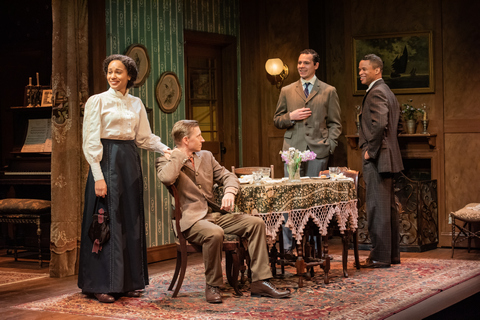
Laakan McHardy, Jeremy Beck, Avery Whitted and Peterson Townsend in a scene from the Mint Theater Company’s production of Elizabeth Baker’s “Chains” at Theatre Row (Photo credit: Todd Cerveris)
[avatar user=”Victor Gluck” size=”96″ align=”left”] Victor Gluck, Editor-in-Chief[/avatar]
The Mint Theater Company continues its three play mini-festival of the forgotten plays of Elizabeth Baker with Chains. Given a polished – maybe too polished – production like the earlier The Price of Thomas Scott, this play is also problematic, but in another way. Unlike her contemporaries John Galsworthy, George Bernard Shaw and Harley Granville-Barker, Baker’s Chains has a very narrow focus: the discontents of the lower middle-class white collar folk.
All of the characters in the play’s first half (the script’s Act I and II) do nothing but either complain about the grind of their daily six-days-a-week jobs (half-holiday on Saturday) or laugh at those who would give up a steady employment. You would think that back in 1909 when the play was written there wasn’t anything else to talk about. Jenn Thompson’s direction is conventional and sedate where something more animated might have been more to the point.
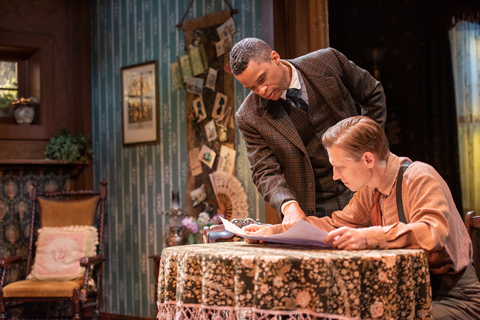
Jeremy Beck and Peterson Townsend in a scene from the Mint Theater Company’s production of Elizabeth Baker’s “Chains” at Theatre Row (Photo credit: Todd Cerveris)
Then at the beginning of the second act the play comes to a boil and the simmering resentments come to the surface. It is a long time to keep an audience waiting but the payoff at the end is highly ironic. While the play has been expertly cast, several of the actors remain bland in underwritten roles. Baker is not a major voice, but she is certainly accomplished in stage craft.
Charley Wilson and his wife Lily live in the Hammersmith district of London. Working at a steady job as clerk in the city, Charley’s income requires that they take in a boarder. Just at the moment that Charley’s boss declares that after a bad year wages must be reduced, their affable boarder Fred Tennant, a single man with no ties, announces that he is leaving in two days to make his fortune in Australia. Charley, Lily, her sister Maggie (a shop worker), her brother Percy, and their next-door neighbor Morton Leslie all weigh in with opinions from Fred is a fool to envy of his gumption. However, when Charley discovers that his wife is now planning to take in two boarders to make ends meet, he revolts and considers joining Fred and having Lily follow after.
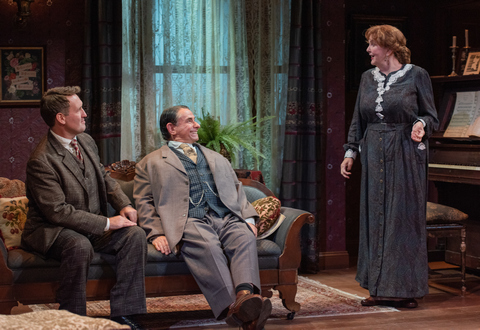
Ned Noyes, Anthony Cochrane and Amelia White in a scene from the Mint Theater Company’s production of Elizabeth Baker’s “Chains” at Theatre Row (Photo credit: Todd Cerveris)
Unfortunately, Lily assumes this means he wants to leave her, and when she reveals this at her parents’ home on Sunday, things become quite explosive. All points of view are aired from Lily’s father’s opinion that one follows in the footsteps of one’s father, Lily’s mother that no one likes their job but everyone is supposed to put up with it, to Maggie’s cheering Charley and Fred on, to Maggie’s fiancé’s that he once felt like chucking it all but mercifully got over it, to Charley’s warning his brother-in-law Percy not to marry too young and be caged. Does Charley have to courage to take a step or his is he chained to wife, family and duty? While the play gives the issue of middle-class discontent a thorough-going over for both men and women, it confines itself to only this one issue to the exclusion of everything else.
Seen previously in the Mint’s Conflict and Hindle Wakes, Jeremy Beck as Charley holds himself back with stiff upper lip until the second act when he finally blazes with fire. Laakan McHardy as his conventional wife remains rather low-key throughout as written. Olivia Gilliatt as her sister Maggie shows a good deal of backbone as she considers if she is marrying her fiancé only to get out of her shop. As the hardy neighbor Mr. Leslie, another clerk who is most complacent, Brian Owen exhibits a good deal of hail-fellow, well-met life and spunk. In an underwritten role, Peterson Townsend as Fred Tennant, the play’s catalyst, is extremely bland.
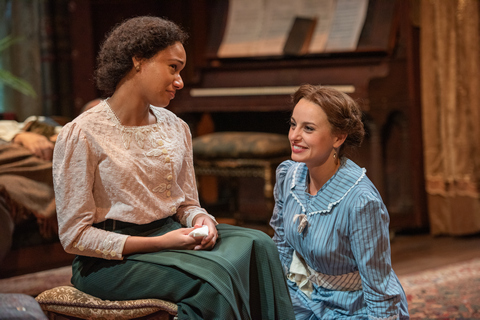
Laakan McHardy and Olivia Gilliatt in a scene from the Mint Theater Company’s production of Elizabeth Baker’s “Chains” at Theatre Row (Photo credit: Todd Cerveris)
Best are veteran actors Anthony Cochrane and Amelia White as the parents of Lily, Maggie and Percy. Both are overcome with indignation at the idea of Charley trying his fortune in the Colonies and risking everything – even if his wife goes with him. Avery Whitted as the naïve 23-year-old Percy and Claire Saunders as his girlfriend Sybil soon to be fiancée are negligible in throwaway, symbolic roles of what Charley and Lily were before marriage. Ned Noyes as Maggie’s comfortably established middle-aged fiancé Walter Foster adds his quiet authority.
The Mint Theater Company which has specialized in forgotten plays of the Edwardian Era has given the play a superb physical production. John McDermott’s clever, extensive and attractive settings allow for the Massey parents’ parlor to be revealed behind that of Charley and Lily’s dining room with pitch perfect props by Chris Fields. The costumes by David Toser are redolent of the period but at the same time reveal the straitened circumstances of all of the characters. Paul Miller’s lighting adds to the atmosphere of the two settings. In M. Florian Staab’s sound design and Emma Weiss’s music direction, the string quartets and piano solos before each scene are perfect for the time period. Amy Stoller’s work with the actors’ British accents is generally excellent.
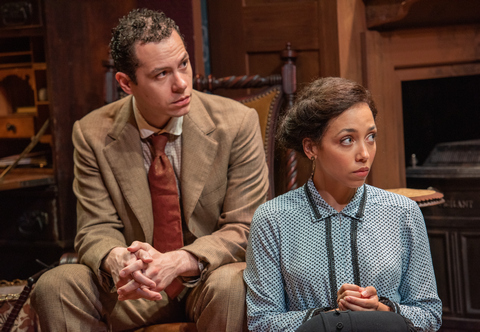
Avery Whitted and Claire Saunders in a scene from the Mint Theater Company’s production of Elizabeth Baker’s “Chains” at Theatre Row (Photo credit: Todd Cerveris)
While the Mint Theater Company has given Elizabeth Baker’s Chains a fine production, director Jenn Thompson has been unable to liven up the first act to obscure that the play is only about one thing. The cast and production is fine but unable to go beyond the confines of Baker’s narrow focus. However, one might enjoy the play without being bothered by these restrictions. Chains like The Price of Thomas Scott reveal the limits of Baker’s dramaturgy. On the other hand, imagine what Shaw, Galsworthy or Granville-Barker would have done with the same material.
Chains (through July 23, 2022)
Mint Theater Company
Theater Five on Theatre Row, 410 W. 42nd Street, in Manhattan
For tickets, call 212-714-2442 ext. 45 or visit http://www.minttheater.org
Running time: two hours and 15 minutes including one intermission






Leave a comment